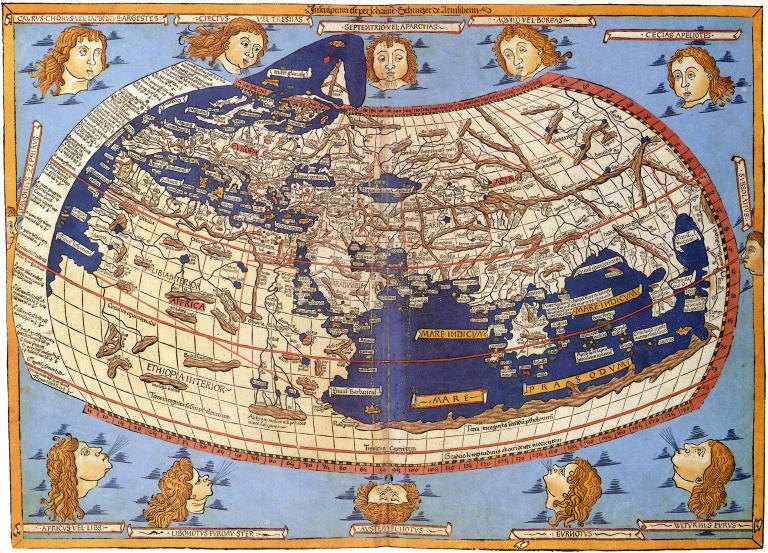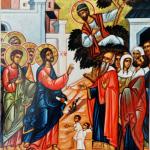
As I’ve been working through much of my old work on Cantonese Protestants and getting it ready for publication, I have realized why for a time the process has been so overly emotional, which led at some points to intellectual paralysis. It is, simply put, that I have had a conversion, and it has taken me time to admit it. In brief, it is that where I used to join my evangelical sisters and brothers in eliding the distinction between oikoumēnē and ekklesia, between the inhabited earth and the earth, these are now distinct entities for me. It is no problem for me to say that evangelicals and me are not part of the same church anymore. It used to anger me when they used to try to convince me that we were, and I’d fume for days on end. I also used to feel really bad that I didn’t think we were in the same church anymore, that I had somehow betrayed them and that I was a bad person thinking bad thoughts that were no longer even Christian. But now I am happy for them to have their ecclesiology and for me to have mine, because there is more to ecclesiology than what I think. Facts, for example, are involved, and those are beyond my ability to change. I had the feeling as I was doing my work that when I read the word church in all of its overdetermined evangelical glory that it was just interesting, neither here nor there. That, I think, is progress. I can therefore write again. Also, I am still a Christian.
Evangelicals remain important in my life because we co-exist on this earth. We also recognize each other as Christian, or at least I do when it comes to them, and I hope for reciprocation when it comes to them thinking of me. Much of my family remains within the networks of evangelicalism too, and so a number of my friends are also evangelical. I suppose to someone who is unfamiliar with this ecclesial insider baseball, I too could be mistaken as an evangelical. In fact, a secular person recently accused me of being an evangelical because I spoke to an on-campus Asian American evangelical group about my Christian practice as a scholar in the secular academy. I am not an evangelical, I said to her. She didn’t get it.
There is, however, a distinction between subjective perception and objective reality. Some may say that the labels don’t matter and that who we are as Christians in the eyes of the world is what counts. I am generally of the view, however, that the world should not be doing theology for the church. The ideologies of modern secularity may be corruptions of Christian theology, but that is all the more reason why modern secular views of Christianity should never be taken as definitive. It does not matter, then, that I may be perceived as an evangelical by some who are unfamiliar with Christian ecclesiology, because that does not change the fact that as a lay person in the Kyivan Church, it is not possible in an objective sense for me to be an evangelical Protestant. I am, of course, a Christian who believes in the Gospel of Jesus Christ. But that is not what makes an evangelical an evangelical.
There are a number of word games that are played around the term evangelicalism. To some, it is that evangel is a Latin corruption of the Greek euangelion, and therefore all it means to be evangelical is to believe and practice the Gospel. I used to say, for example, that I have remained evangelical as an Eastern Catholic because I kiss the Gospel at the Little Entrance. I was, of course, accused then of playing games with words, and while I did not see the trouble with that earlier on in my mystagogy, I now understand it to be playing with fire. Words are not empty signifiers; they are components of the speech by which worlds are built.
To others, all Protestants are evangelicals because that is what Luther called himself. But such conceptual opining is disingenuous. There exists an Anglo-American institutional network that began in the 1890s, with some infrastructural debts to the Second Great Awakening and maybe the First too, that is what we now think of as evangelicalism. It was cross-denominational, funded by corporate businessmen, and dedicated to advancing a kind of Protestant theological conservatism through its institutions. Some people who are not white have subsequently joined it, sometimes willingly, other times not so much, and still others for the educational and economic perks it sometimes promises. But the claim that evangelicalism is now non-white is what the theologians call an overrealized eschatology. It is more wishful thinking than it is a reality, and if quantitative social science is anything to go by, the political scientist Janelle Wong shows that the numbers of non-white evangelicals in America are not as substantial as most people want to think, nor do they really make a dent in a white evangelical political agenda.
Some may say, then, that the centrality of America in my account does not take into account what is known as ‘World Christianity.’ Unfortunately for them, I used to be an Anglican in the realignment. As the theologian Michael Poon points out, we invented the concept of ‘Global Christianity’ (or at least Phil Jenkins did) to justify African and Southeast Asian archbishops crossing jurisdictional territories in North America. What’s more, the uncritical celebration of such things lead to some ludicrous causes for celebration, such as an article that will go unlinked here in which an evangelical theologian rejoiced that, with the modern circuits of Global Christianity, the Gospel had finally come to Ethiopia – and unfortunately, said blogpost was authored neither by the Holy Apostle Philip nor the Ethiopian eunuch. Of course, having read both the Comaroffs and Dana Robert, I am well aware that ‘World Christianity’ and ‘Global Christianity’ are different fields in academia. However, I am also averse to word games.
Moreover, the conservative theology advanced in evangelicalism is not necessarily Orthodox, though it certainly is Protestant. Its features include emphases on cruciform substitution, the literal truth of Scripture as the Word of God, and individual conversion experiences. Some have tried to claim that this evangelicalism is Orthodox because it is fundamentally Nicene. Perhaps all evangelicals can recite the Nicene Creed, but I’d only be able to sign off on evangelical statements of faith on a case-by-case basis. It would depend, for example, on what is meant by substitutionary atonement, or biblical inerrancy, or the experience of conversion. I could probably agree with some of all three, if they were broadly construed enough. But I also don’t play word games anymore.
To be evangelical, however, is not just a matter of faith. It is a matter of membership. When I speak at an evangelical event or engage my sisters and brothers in evangelicalism, they are ecumenical encounters. We co-exist on the inhabited earth, and we are Christians; why should we not be friends and call each other sisters and brothers? Indeed, what’s not to say that we should not even be lovers? But to say that we are therefore members of the same Body of Christ is overdetermined, as is to say that we are in the same church. For one, the church is not the same as the Body of Christ. For seconds, I am not sure how to conceptualize being in the same Body of Christ with folks who don’t have any concept of being in communion. Church and the Body of Christ are not metaphors, and they are certainly not fantasies. They are bodily realities. For these reasons alone, it is impossible for us to be in the same church, and it is difficult to articulate how it is that we are part of the same Body of Christ. We are part of the same inhabited earth. That is as far as I’ll go. I do not know how else to put it, as I am averse to saying that the material and the imagined are the same thing. Of course, if I have not represented evangelical theology on this matter well, I am happy to be corrected. However, I am also not interested in word games about communion. It is, or it is not, material.
There are some who will find this reflection scandalous. It is indeed a scandal for the Body of Christ to be divided. However, that is also not the same as saying that there are different local churches. I may not be evangelical, but I am Eastern Catholic. In this way, I am also not in the Latin Church. The difference between my relationship with the Church of Rome and the networks of evangelicalism, though, is that my church, the Greek-Catholic Church of Kyiv, is in full communion with Rome. The scandal is actually that we are not in communion with many of the other churches that call themselves Orthodox, including the other churches of Kyiv. With the developments in the Orthodox Church in Ukraine, we hope that this problem will be fixed, that perhaps there might even be double communion between ourselves and Rome and with the Orthodox. But the point is that it is possible to be distinct local churches and in communion with other churches in the sense of truly being the Body of Christ in a bodily way. To be a particular, self-governing, self-headed church, and to affirm that we are therefore distinct from other churches with whom we are in full communion, is therefore not scandalous at all; this formulation even works with the insistence of the Vatican document Dominus Iesus on there being ‘one Church,’ which I suppose is one among many reasons why it is completely possible for us to be in communion with the Latin Church, though we are so different in liturgy, ideology, and theological obsessions. The scandal lies in us not being in communion with other churches, in the sense that it shows that the Body of Christ is broken, bleeding, fragmented, and in schism. That is why ecumenism is important. We must heal the Body of Christ. This is also not a word game. I am in the global local church of Kyiv, where my patriarch is seated. We are a self-governing, self-headed church in full communion with Rome according to the terms of the Union of Brest. This description concerns a material reality, not a figment of imagination or a fantasy of a reality to come.
Therein lies the trouble with ecumenism with evangelicalism. Certainly, not being in communion with other Christians is a scandal because it shows the brokenness of the Body of Christ, and it is tempting for some people therefore to invent a fictional ‘invisible church’ where we are all secretly in communion. But the theological problem when it comes to being in communion with the networks of evangelicalism is that it is not possible to be in communion with systems that don’t run on communion. As a system, evangelicalism tends to run on ideology. What is shared are common beliefs, and institutions tend to be formed on the sharing of those values and broken when those ideologies become incompatible. Yet communion is not ideological, at least not in a theological sense, though Henri de Lubac SJ showed that it did become so in the Latin Church when the corpus mysticum became equated with the Holy Roman Empire.
But at heart, communion is a material reality. It is physical existence as it is supernaturally constituted. This insurmountable problem is why I really cannot say that I am in the same Body of Christ as evangelicals. I do not know if it is possible to be in communion with systems with no sense of communion. I hope someone smarter than me will theologize about this difficulty. Maybe they will be able to differentiate between persons and systems in evangelicalism at a higher level than I can. I am not smart or holy enough to do so. As a person, all I can do is to keep talking to evangelicals and have them tell me about themselves, while I tell them about me, while walking together in love with them. But I am not capable of the intellectual gymnastics to overcome the obstacles that prevent us from saying that we are in the same church, or in the Body of Christ together.
However, that the impossibility of being in full communion with evangelicals is a problem means that we should talk about it. Maybe in talking about it, we will be able to work something out theologically eventually. The point of this post, however, is that I am finally fine with not being in the same church, or even in the Body of Christ, with evangelicals. On the first point – being in the same church – it’s pretty much a no, we are not from me, though if our ecumenism results in us working something out, then there will be new conversations about what church means and whether what we are talking about is being one church or being in full communion as churches, though that will require us Catholics and Orthodox to think of evangelicalism as church, which is also a point on which we must be persuaded from evidence. Certainly there are communities, and there are gatherings of persons within the infrastructure of evangelicalism. Moreover, I am happy to say that Protestants have churches. However, evangelicalism does not compose all of Protestantism, especially not in our contemporary situation, and I would like to learn about whether evangelicals conceive of any meaningful difference between private corporations and churches. I suspect that this conversation will be generative, as a number of evangelicals I know complain precisely about their corporate problems in the language of economics instead of economia. What I am saying is that I hope that evangelicals who read this will not be offended by my frankness, as I think that discussion on this point may end up being very fruitful in the end. It seems, for example, that most of my more disgruntled evangelical friends wish that their churches were more truly church, and while my less-than-holy perverse impulse may be to invite them to join my church, what is probably better would be to pursue the ecumenical conversation by which both of us may be ecclesiologically enriched.
On the second point, I am agnostic about the question of the Body of Christ, since it concerns mystical realities that are beyond me, and systems and persons really are different, but again, it is hard to reconcile materiality with fantasy. It no longer makes me angry, though it still remains a painful reality for everyone involved. Someone might also say that they detect a kind of superiority from me in relation to evangelicalism because I am now Eastern Catholic. But that is like accusing a Hong Kong Cantonese person of feeling superior to their British colonizers. Evangelicalism is a hegemonic global form of Christianity, and Eastern Catholicism is not. Structurally, the accusation falls flat. I am in a colonized church. I am sure that my evangelical sisters and brothers of color feel colonized by evangelicalism too, but that is not the same as saying that evangelicalism is colonized. It is colonial. The Kyivan Church is colonized; other colonial powers want a piece of us, whereas evangelical systems usually want a piece of someone else. Fortunately, again, systems and persons are also not the same, which is why it is possible to call my sisters and brothers sisters and brothers. They may wonder, of course, why it is that I chose to convert to a colonized church. I must clarify that I am not complaining about my situation, then. In many ways, I had been colonized within evangelicalism and Anglicanism, and using the Hong Kong Umbrella Movement as a vehicle, the Holy Spirit then blew me into a church that matched my experience. Nowadays, I am not colonized within a colonial structure. I am simply part of a colonized church, where other powers outside our church constantly threaten to take our self-governance away from us. It is fun to be part of this church. Most of our infighting, of which I am sometimes a part, is over how to deal with our situation of ecclesial colonization. That is actually quite nice because we seldom have to litigate among ourselves whether we are colonized or not. There is always more intellectual clarity when less gaslighting is involved.
The point, though, is that I feel like I can write about evangelicalism again with a cooler head and even hang out with evangelicals so much that I get mistaken as one of them. There is a certain peace in acknowledging that there is a serious theological problem in ecumenism with evangelicals. From that acknowledgement, we can walk together in love. Fundamentally, we are still persons, and we still live on this earth together. But that is not the same as saying that we are in the same church, or in the Body of Christ together. It simply means that we inhabit the world together, and on that basis alone — which means that we must guard against the perversions of ideology on the sacred ground of ontology — do we come to love each other deeply.











